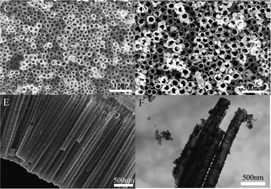Selenium nanoparticles incorporated into titania nanotubes inhibit bacterial growth and macrophage proliferation
Abstract
Since implants often fail due to infection and uncontrolled inflammatory responses, we designed an in vitro study to investigate the antibacterial and anti-inflammatory properties of titanium dioxide nanotubes (TNTs) incorporated with selenium nanoparticles (SeNPs). Selenium incorporation was achieved by the reaction of sodium selenite (Na2SeO3) with glutathione (GSH) under a vacuum in the presence of TNTs. Two types of bacteria and macrophages were cultured on the samples to determine their respective antibacterial and anti-inflammatory properties. The results showed that the TNT samples incorporating SeNPs (TNT-Se) inhibited the growth of Escherichia coli and Staphylococcus aureus compared to unmodified TNTs, albeit the SeNP concentration still needs to be optimized for maximal effect. At their maximum effect, the TNT-Se samples reduced the density of E. coli by 94.6% and of S. aureus by 89.6% compared to titanium controls. To investigate the underlying mechanism of this effect, the expression of six E. coli genes were tracked using qRT-PCR. Results indicated that SeNPs weakened E. coli membranes (ompA and ompF were down-regulated), decreased the function of adhesion-mediating proteins (csgA and csgG were progressively down-regulated with increasing SeNP content), and induced the production of damaging reactive oxygen species (ahpF was up-regulated). Moreover, TNT-Se samples inhibited the proliferation of macrophages, indicating that they can be used to control the inflammatory response and even prevent chronic inflammation, a condition that often leads to implant failure. In conclusion, we demonstrated that SeNP–TNTs display antibacterial and anti-inflammatory properties that are promising for improving the performance of titanium-based implants for numerous orthopedic and dental applications.


 Please wait while we load your content...
Please wait while we load your content...